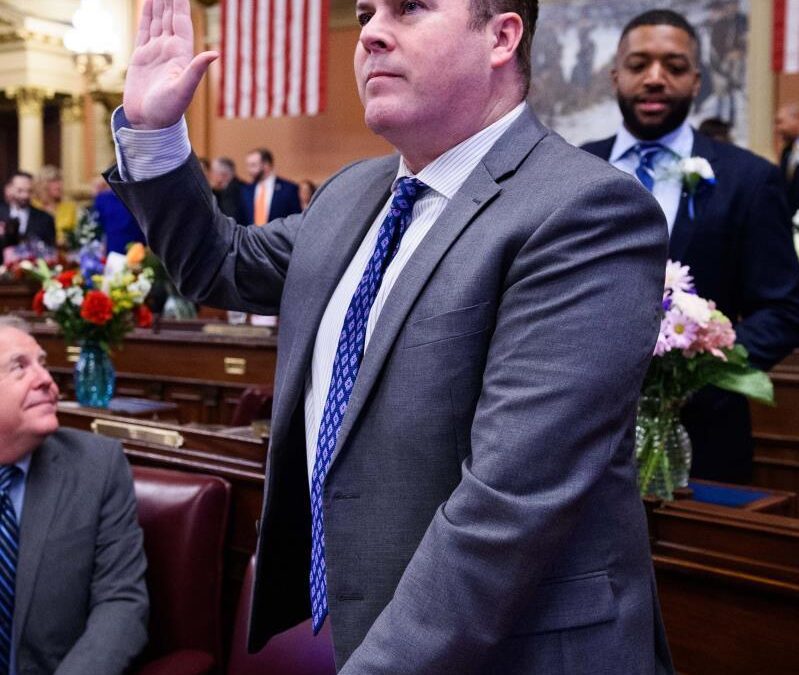
COURIER Illustration (Denzel Boyd)
Transforming students’ lives beyond the four walls of a classroom is, arguably, a tenet of being a successful teacher. This year in particular, that skill is invaluable.
To say that 2020 has been rough is putting it mildly. But even amid the death, division, and chaos, people have stepped up and shown us that there is still good in the world. While some of them reject the “hero” label, the sacrifices of these Americans deserve recognition for their impacts on our lives. Today, we are shining a spotlight on the teachers who are making it work, on Zoom or in person.
As a special-education teacher, the biggest challenge Ellie Robbins has faced this year is the fact that she can’t be hands-on with her students. Making her curriculum accessible for her students took a lot of time and effort, but really getting to know them—and helping them feel comfortable and safe in her care—has been even harder. Robbins, who teaches 7th grade math, has found herself simultaneously creating new materials, while cutting down her existing curriculum.
“Often my job is very flexible—adapting a lesson based on students’ performance, questions, even body language reacting to our teaching,” Robbins told COURIER. “That is very hard to do when you can’t actually see the students! Math is also not a subject that lends itself well to online learning.”
Sorting Fact From Fiction: Sign Up for COURIER’s newsletter.
In addition to teaching, Robbins also takes on the case management of her students at Patuxent Valley Middle School in Savage, Md. This involves monitoring their progress, communicating with their other teachers, and ensuring that their Individualized Education Program (IEP) is being implemented properly. Ensuring all of these needs are met has been difficult to do from the “classroom” inside her home and behind her computer. Keeping an open line of communication with each of her students has helped.
“I’ve simply tried to be positive and continually remind kids to ask for help with anything they need—not just in my math classes but in any class, or anything else they are struggling with,” Robbins said. “I want them to feel like they have a ‘go-to person.’”
RELATED: Teachers Are Essential Workers. Should They Be Next for Vaccines?
She believes recognizing her students’ hard work as they, too, navigate the current “new normal” and finding ways to make them feel good about themselves is crucial for everyone’s success this year. Becoming more “tech-savvy” has given Robbins the tools she needs to get a little creative with positive reinforcement.
“My cat has become an integral part of our math lessons,” she explained. “She’ll pop in often, and we say things like ‘Don’t forget to double-check your steps or Miss Kitty will be mad!’”
Miss Kitty also gives “weekly shout-outs” to the 12 and 13-year-olds in Robbins’ class through Google Slides. “They started simple, like a shout-out for participating in class, but as we’ve gotten to know the students better, they’re more specific, like a student who finishes his homework that week or comes for extra help.”
And, of course, the kids love it. “I think it started as kind of a goofy thing, but the kids are really into it now! Anything to make school more fun.”
Transforming students’ lives beyond the four walls of a classroom is, arguably, a tenet of being a successful teacher. This year in particular, that skill is invaluable. Teachers have had to take on the challenge of performing their job during a global public health crisis that has dramatically shifted the landscape of learning: they’re navigating new technology, finding creative ways to reach their students, while also enduring the stress of the COVID-19 pandemic along with the rest of the world.
Simply put, teachers are the heroes we need right now.
Building Relationships and Finding Routine … When There’s a Global Pandemic
Cultivating a relationship with her students is at the forefront of being an effective teacher for Jen Bebout, who teaches mathematics to 10th and 11th graders at Quaker Valley High School in Sewickley, Pennsylvania, a suburb about 12 miles west of Pittsburgh. Like a majority of teachers this year, Bebout has faced hardships with virtual learning.
“For me, the most challenging aspect of virtual learning is that it is so, so very hard to develop a relationship with a student on Zoom,” she told COURIER. “I like to think that one of my better skill sets in the teaching profession is the relationships that I build with students. While this isn’t impossible right now, it is a lot harder and doesn’t seem to happen as organically.”
Both educators and their students thrive on routine, and the 2020-21 school year hasn’t given schools much of an opportunity for consistency. Some students opted for full-time virtual learning, and many are navigating a combination of online and in-person instruction.
“I have only seen some students in-person once a week,” Babout said. “I found that for my high school students, most of them did not seem to enjoy the change in routine just to come to school one day a week.” Because there aren’t as many students in class this year, they’re not as engaged with one another as they used to be.
“I have learned more in the past couple of months in terms of what is out there, technology-wise, than I have in the first 12 years of my teaching career.”
It can be difficult any year to get high schoolers excited about Algebra 2, so Babout had her work cut out for her this year. Getting familiar with interactive technology has been a key element to getting the job done.
“I have learned more in the past couple of months in terms of what is out there, technology-wise, than I have in the first 12 years of my teaching career.”
She credits programs like Nearpod, where teachers can create interactive quizzes, polls, and videos, and Desmos, where teachers can build their own math-based activities. “My favorite new thing I’ve started to implement is JamBoard break-out rooms where students can talk to one another as they work on a problem,” Babout added. JamBoard is a Google app that works similarly to a Google Document, which allows students to work on a problem together at the same time.
To prevent student burnout, Babout and her math department colleagues have tried to nail down and tweak a routine that works for everyone. “There are only so many hours in a day,” she said. “Finding the right mix of routine and new activities while still maintaining our own sanity is super important.”
Taking It One Day at a Time
In addition to making sure their students’ needs are met, tapping into a little self-care is crucial for teachers this year. Succumbing to the myriad frustrations of trying to operate a functional learning environment during a pandemic is human, and of course, valid.
For Robbins, taking each day as it comes is an effective coping strategy.
“Goodness knows I’ve had my share of rough days, and days where I log out of class or a staff meeting and just cry, but we have to take one day at a time,” she said. “We also have to take care of ourselves. I’m incredibly proud of how the students have adapted to this “new normal’ and I’m insanely appreciative of all the extra work that parents are doing to help. It truly takes a village.”
Parents of school-aged children have had to worry about their child’s physical and mental health this year in ways no one could have predicted. Babout knows a major concern for parents everywhere is making sure their kids are able to keep up with their academics, but she doesn’t want them to worry—teachers have it covered.
RELATED: Trump Officials Pushed CDC to Release Data Downplaying Risk of Reopening Schools
“I’ve seen a lot of people post on social media about how to make sure their children are not ‘falling behind,’” she explained. “And while I certainly get that concern, teachers are professionals. We are trained to meet students where they are in terms of what they are able to do and build upon that base of knowledge. We aren’t perfect and we may not have all of the answers, but most of us are going to try our very best to help your child learn and be successful—and that includes meeting them where they are.”
Coping skills aren’t taught in a classroom. They’re earned and cultivated through experiences good and bad, and even if kids learn how to cope by living through something traumatic like the pandemic, they’re learning something valuable.
“Students are learning skills right now that are not measured on a test: self-sufficiency, resilience, a really impressive understanding and use of technology, and how to communicate in an online environment,” Babout said. “My advice to everyone right now, parents and teachers alike—give yourself grace, try to focus on the positive, and take one day at a time.”
READ MORE: Heroes of 2020: Three Americans Share Why They Volunteered For COVID Vaccine Trials
Politics

Philadelphia DA cancels arrest warrant for state Rep. Kevin Boyle on eve of Pa. primary
Philadelphia District Attorney Larry Krasner said a detective had sought the warrant against Boyle, a Democrat whose district includes a section of...

Influencers and creators find new ways to engage young Philadelphia voters
Rec Philly, a space for creators and influencers, teamed up with Show Up Strong to get hundreds of young Philadelphia residents engaged in the...

New Biden rule protects privacy of women seeking abortions
Under the new rules, state officials and law enforcement cannot obtain medical records related to lawful reproductive health care with the goal of...
Local News

Conjoined twins from Berks County die at age 62
Conjoined twins Lori and George Schappell, who pursued separate careers, interests and relationships during lives that defied medical expectations,...

Railroad agrees to $600 million settlement for fiery Ohio derailment, residents fear it’s not enough
Norfolk Southern has agreed to pay $600 million in a class-action lawsuit settlement for a fiery train derailment in February 2023 in eastern Ohio,...





